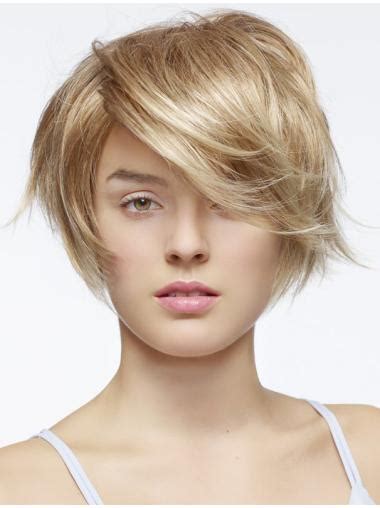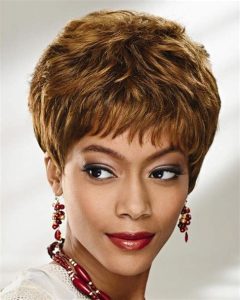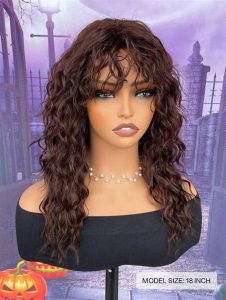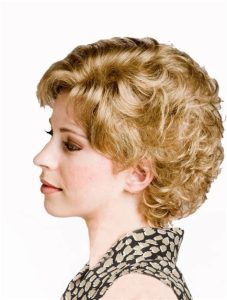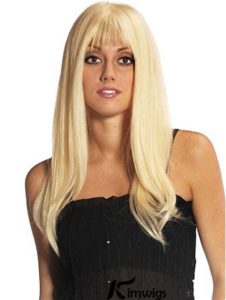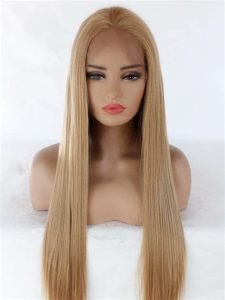16″ Layered Synthetic Monofilament Wigs: Essential Guide for
Introduction
In today’s vast wig market, navigating the complexities of different types and styles can be daunting. However, one standout option that has gained significant popularity is the layered synthetic monofilament 16″ long wig. Known for its versatility, comfort, and natural appearance, this wig has become a top choice for those seeking a fashionable and hassle-free hair solution.

What is a Layered Synthetic Monofilament 16″ Long Wig?
As its name suggests, this wig features a synthetic fiber construction that mimics the texture and appearance of human hair. The “monofilament” part refers to the thin, mesh-like base material that allows the hair fibers to be individual knotted, creating a natural scalp effect. This results in a more realistic and breathable wig that can be styled and parted as desired.
The 16″ length provides ample coverage and versatility, making it suitable for various face shapes and hairstyles. The layered design adds volume and movement, creating a flattering and chic look.
Advantages of Layered Synthetic Monofilament 16″ Long Wigs
- Natural Appearance: The monofilament base and individual knotted hairs create an incredibly natural-looking scalp, making it difficult for others to distinguish from real hair.
- Comfort and Breathability: The monofilament base is thin and lightweight, allowing for maximum scalp ventilation and comfort.
- Styling Versatility: Unlike other synthetic wigs, layered monofilament wigs can be styled with heat tools, giving you the freedom to experiment with different looks.
- Durability and Affordability: Synthetic fibers are more durable than human hair, ensuring a longer lifespan for your wig. They are also more affordable than human hair wigs, making them a cost-effective option.
- Low Maintenance: Synthetic wigs need minimal maintenance compared to human hair wigs. They can be washed and dried with relative ease.
Disadvantages of Layered Synthetic Monofilament 16″ Long Wigs
- Heat Sensitivity: While layered monofilament wigs can be styled with heat, prolonged exposure to high heat can damage the synthetic fibers.
- Shorter Lifespan: Although synthetic wigs are generally durable, they have a shorter lifespan than human hair wigs and may need to be replaced more frequently.
Common Mistakes to Avoid
- Over-styling: Excessive use of heat tools can reduce the lifespan of your wig. Heat protectants and proper styling techniques are essential.
- Improper Cleaning: Use wig-friendly shampoos and conditioners and avoid harsh chemicals that can damage the fibers.
- Rough Handling: Handle your wig gently to avoid tangles and breakage. Use a wide-tooth comb or detangling brush.
- Incorrect Storage: Keep your wig in a cool, dry place when not in use. Avoid exposing it to UV rays or extreme temperatures.
- Neglecting Maintenance: Regular cleaning, conditioning, and brushing are crucial to maintain your wig’s appearance and longevity.
Market Insights
- The global wig market is expected to reach $15.6 billion by 2025, according to Grand View Research.
- Synthetic wigs account for a significant portion of the market, with a growing preference for layered monofilament wigs due to their natural appearance and comfort.
- The demand for long wigs has remained consistent, making the 16″ length a popular choice for those seeking versatility and coverage.
Current Status and Future Directions
Layered synthetic monofilament 16″ long wigs are currently a well-established product category with a strong consumer base. However, continuous innovation is driving the development of new and improved wig technologies.
- Nanofiber Wigs: Research is being conducted to develop wigs made with nanofibers, which are even finer than synthetic fibers, offering even greater realism and breathability.
- Smart Wigs: Advancements in wearable technology could lead to “smart” wigs that can be integrated with sensors to monitor hair health or even change color.
- Customized Wigs: 3D scanning technology is enabling the creation of custom-fitted wigs tailored to individual head shapes, providing a perfect and comfortable fit.
Conclusion
Layered synthetic monofilament 16″ long wigs offer a perfect balance of natural appearance, comfort, and versatility. By understanding their benefits and avoiding common mistakes, you can maximize the lifespan and enjoyment of your wig. As technology continues to evolve, the future of wigs holds exciting possibilities for even more advanced and personalized hair solutions.
Table 1: Synthetic Fiber vs. Human Hair
| Feature | Synthetic Fiber | Human Hair |
|---|---|---|
| Texture | Mimics human hair | Natural |
| Durability | More durable | Less durable |
| Heat Resistance | Lower | Higher |
| Affordability | More affordable | More expensive |
| Maintenance | Low maintenance | Requires regular styling and care |
Table 2: Monofilament vs. Other Wig Base Types
| Feature | Monofilament | Lace Front | Capless |
|---|---|---|---|
| Scalp Appearance | Natural scalp effect | Realistic hairline | Visible cap |
| Breathability | Excellent | Good | Limited |
| Styling Versatility | High | Medium | Low |
| Cost | Higher | Medium | Lower |
Table 3: Common Wig Care Mistakes
| Mistake | Cause | Consequences |
|---|---|---|
| Excessive Heat Styling | Damages synthetic fibers | Reduced lifespan, loss of shine |
| Harsh Cleaning Chemicals | Can damage hair fibers | Premature wear and tear |
| Rough Handling | Causes tangles and breakage | Unkempt appearance |
| Improper Storage | UV exposure and extreme temperatures | Color fading, dryness |
| Neglecting Maintenance | Dirt and oil buildup | Dullness, tangles, reduced lifespan |
Table 4: Future Wig Innovations
| Innovation | Benefits | Examples |
|---|---|---|
| Nanofiber Wigs | Greater realism and breathability | Still in research and development |
| Smart Wigs | Integration with sensors | Possible features include hair health monitoring and color change |
| Customized Wigs | Perfect fit and comfort | 3D scanning technology for personalized designs |

